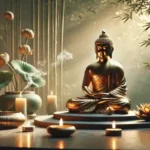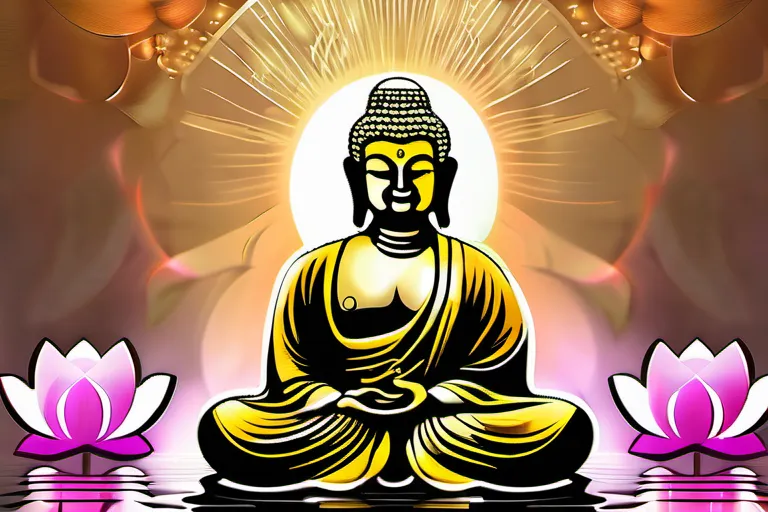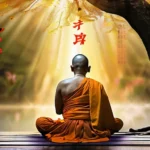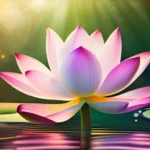Explore the philosophical and spiritual foundations of reincarnation in Buddhism, its role in karma, and its impact on the Buddhist path to enlightenment.
Buddhism is a religion that emphasizes the pursuit of enlightenment through personal spiritual development. One of its core beliefs is the concept of reincarnation, which plays a crucial role in understanding the Buddhist path to liberation. In this article, we will delve into the intricacies of reincarnation in Buddhism and how it shapes the Buddhist journey.
The Concept of Reincarnation in Buddhism
In Buddhism, the belief in reincarnation is intricately woven into its fabric, serving as a cornerstone for understanding one’s journey through life. How can something as vast and complex as the universe be condensed into such a simple yet profound concept? Imagine the universe like an endless ocean where each drop represents an individual soul; with every action, this drop either sinks deeper or rises higher, determined by its weight.
The origins of reincarnation in Buddhism trace back to ancient Indian philosophical traditions, but it was the Buddha who transformed these ideas into a comprehensive system. He taught that life is not just a single existence but a series of rebirths, driven by actions and their consequences. This cycle is often depicted as a wheel, perpetually turning with no beginning or end.
But how does this belief impact the Buddhist path to enlightenment? In Buddhism, the ultimate goal is not merely escaping the cycle but understanding it fully. The journey through reincarnation becomes a metaphor for spiritual growth and transformation. Each rebirth offers an opportunity to learn from past mistakes, refine one’s understanding of the four noble truths, and ultimately achieve liberation.
It’s like being given multiple chances to master a difficult dance; each time you fall, the next step brings greater wisdom and grace. The belief in reincarnation thus transforms fear into courage, as Buddhists see every life not as a final destination but as part of an endless journey towards enlightenment. In this process, one learns that true freedom lies not in avoiding suffering but in understanding its nature and transcending it.
So, how does this belief shape the daily practice of a Buddhist? It encourages them to live mindfully, aware that their actions today will have consequences tomorrow. This concept challenges us to consider not just our immediate desires but the long-term impacts of our choices on ourselves and others. The journey through reincarnation becomes a map for ethical living, guiding one towards compassion, wisdom, and ultimately, liberation.
The Role of Karma in Reincarnation
Imagine reincarnation as a river, flowing endlessly, with each life cycle representing a tributary merging into it. In Buddhism, this concept is deeply intertwined with the idea of karma, creating an intricate dance of cause and effect that shapes one’s future existence.
Karma in Buddhism is not just about past actions; it’s a dynamic process that influences every moment. How can we truly grasp the weight of our deeds? From planting a seed to watching it grow, each action has its consequences, rippling through time and space. These karmic seeds are sown in this life and bear fruit in future lives, shaping the circumstances one encounters.
The relationship between karma and reincarnation is like a seesaw, balancing out good and bad actions. Positive actions lead to better rebirths, while negative ones can result in undesirable conditions. However, the complexity lies not just in the balance but in the intentions behind our actions. A seemingly small act of kindness or malice could have profound impacts on one’s future existence.
Understanding karma is crucial for navigating this river of reincarnation. Buddhists believe that awareness and mindfulness are key to transforming negative karmic patterns into positive ones. By reflecting on our actions, we can begin to see the interconnectedness of all things and the role each one plays in creating a virtuous cycle.
The ultimate goal is to achieve nirvana, where one transcends the cycle of rebirth altogether. Along this path, understanding karma and its influence on reincarnation becomes not just knowledge but wisdom that guides every step. As we journey through life after life, our actions shape who we are, where we go next, and how close we get to enlightenment.
The Buddhist Path to Enlightenment and Reincarnation
Imagine walking along a winding path, each step leading you deeper into the heart of a vast forest. In this journey, reincarnation plays a pivotal role in Buddhism, much like navigating through a dense jungle where every decision and action can influence your next path. How does reincarnation fit into the Buddhist path to enlightenment? Let’s explore this idea by considering it as a continuous flow of rivers, each tributary feeding the main stream.
Reincarnation in Buddhism is not just about rebirth; it’s about understanding the cycle of existence and its connection to enlightenment. Each life is seen as a stepping stone, where the ultimate goal is to escape from this endless loop. But how do we make sure that each step brings us closer to achieving this ultimate goal?
In Buddhism, enlightenment is often referred to as Nirvana, a state of perfect peace and understanding. The path to Nirvana involves transcending the cycle of rebirth, which is deeply intertwined with the concept of karma. As we delve deeper into our journey, we begin to see that each life, no matter how brief or long, contributes to our spiritual growth.
Consider a garden where every seed planted has the potential to grow into something beautiful. Just as seeds need the right conditions to sprout, so do actions in this life impact the next. The idea of cause and effect is central here; your actions today will determine your experiences tomorrow.
In this context, reincarnation becomes a powerful tool for self-reflection and mindfulness. By understanding that every moment is an opportunity to act with compassion and wisdom, we can navigate the complexities of life more effectively. It’s like walking a tightrope, but instead of relying on external safety lines, we use our inner strength and wisdom to guide us.
So, as we continue this journey, how do we ensure that each step brings us closer to enlightenment? By embracing every moment with awareness, by learning from the past, and by striving for a more compassionate and understanding approach to life. In Buddhism, reincarnation is not just about rebirth; it’s a continuous process of transformation and growth.
The Impact of Reincarnation on Daily Life
How does the belief in reincarnation actually impact our daily lives as Buddhists? It’s not just about believing in past and future lives; it’s how these beliefs shape our present actions and interactions. If we think of life as a continuous stream, reincarnation becomes a reminder that every moment counts towards the broader narrative of our existence.
Imagine life as a garden, where each action is like planting a seed. What we sow today might not yield results until next time around, but it certainly influences the soil and climate for future growth. This understanding of causality through karma guides us in making conscious choices every day. Would you want to plant thorns or flowers? The answer shapes our interactions with others and ourselves.
Reincarnation also offers a lens through which we can view suffering. If each life is part of an endless cycle, how do we break free from the chains of pain? Buddhism suggests that understanding the Four Noble Truths—especially the truth of the cause of suffering (dukkha)—is crucial. By recognizing and accepting this cycle, we begin to see ways out, paths that lead us towards Nibbana or enlightenment.
In our daily lives, this means cultivating compassion, mindfulness, and ethical conduct. Every act of kindness, every moment of awareness, contributes to the collective garden of our souls. The belief in reincarnation is not just a philosophical concept; it’s a practical guide that helps us navigate through life’s complexities with wisdom and equanimity.
So, how do we reconcile this belief with the realities of everyday life? By seeing each day as an opportunity to plant seeds of goodness and understanding. In this constant interplay between past lives and future potentials, we find our purpose in becoming better versions of ourselves, ready for the next chapter of our journey.
Reincarnation is not just a belief; it’s a practice that informs every thought and action. It’s about living with intentionality, knowing that each moment is part of a greater story—yours and ours. How do you approach this daily with intention?
Remember, the path to enlightenment begins with a single step. Each day presents new opportunities to walk towards freedom from suffering.
Reincarnation and the Four Noble Truths
Reincarnation, often seen as a central theme in Buddhism, intertwines seamlessly with the profound teachings of the Four Noble Truths. How does this belief shape our understanding and approach to life? Let’s delve into the intricate relationship between reincarnation and these core principles.
Why do we suffer? According to the First Noble Truth, suffering (dukkha) is an inherent part of existence. But what if this suffering isn’t just a fleeting moment but a recurring theme in our lives? Could it be that each life cycle offers us another chance to address and overcome our suffering? This question leads us directly into the realm of reincarnation.
Imagine life as a river, flowing endlessly from one bank to another. Each bend and twist represents a new existence, where we may find ourselves dealing with similar challenges or different ones. The Four Noble Truths guide us in understanding this cycle: acknowledging suffering, identifying its cause (craving), finding the path that leads to its cessation, and realizing enlightenment.
What is the root of our suffering? The Second Noble Truth points towards craving as the primary cause. But how does this relate to reincarnation? Could it be that our desires, fears, and attachments follow us from one life to another, perpetuating a cycle of suffering? This realization encourages us to examine every aspect of our existence critically, seeking ways to let go of these attachments.
How can we end suffering? The Third Noble Truth offers hope: an end to suffering is possible through the cessation of craving. In the context of reincarnation, this means recognizing that our true selves are not bound by our physical existence but transcend it. By understanding and embracing this non-attachment, we can embark on a path towards enlightenment, breaking free from the endless cycle.
The Fourth Noble Truth outlines the Eightfold Path as the way to achieve this goal. Each step of the path—from right view to right concentration—guides us in transforming our lives, making them more aligned with the principles that will eventually lead to liberation from suffering.
In essence, reincarnation in Buddhism is not just a belief but a practical tool for spiritual growth. It challenges us to see beyond our current existence and consider the broader implications of our actions. By understanding the Four Noble Truths through this lens, Buddhists are encouraged to live each moment with mindfulness, compassion, and wisdom, striving towards the ultimate goal of enlightenment.
The Philosophical Debate over Reincarnation
The belief in reincarnation forms a crucial cornerstone in Buddhism, but what exactly does it entail? Is it merely a concept derived from ancient myths and superstitions, or is there more to it than meets the eye?
Consider this: if you were to travel through time, would you find yourself in a similar path of existence, or would your journey be entirely different?
The philosophical debates surrounding reincarnation in Buddhism are complex and multifaceted. On one side, many Buddhists embrace the idea that rebirth is an inevitable part of the cycle of existence, where every action has consequences that echo through lifetimes. But what about those who question this belief? Do they dismiss it outright, or do they see it as a mere construct?
- For: The argument for reincarnation in Buddhism often hinges on the law of karma. If your actions in one life shape your future lives, how can you truly understand the full consequences of your choices? Reincarnation becomes a tool to explore this concept further.
- Against: Critics might argue that reincarnation is an unverifiable concept. Without direct evidence or empirical proof, it remains speculative. Can we really know what happens after death?
Buddhism itself offers a nuanced view, suggesting that while reincarnation can be accepted as a belief, the ultimate goal is to break free from this cycle and achieve enlightenment (Nirvana). This path is not about reincarnating but rather transcending the need for rebirth altogether. Yet, in the meantime, the belief in reincarnation serves as a powerful motivator: if your actions have repercussions that span lifetimes, wouldn’t you strive to make them positive?
In essence, the debate over reincarnation is not just about whether it exists but how it shapes one’s understanding of their place in the world and their path towards enlightenment. It invites us to question our very existence and the choices we make along this journey.
Conclusion
 By understanding the principles of reincarnation and karma, we can gain a deeper appreciation for the Buddhist path to enlightenment. This knowledge can inspire us to live more mindfully and compassionately, ultimately leading to a more fulfilling life.
By understanding the principles of reincarnation and karma, we can gain a deeper appreciation for the Buddhist path to enlightenment. This knowledge can inspire us to live more mindfully and compassionately, ultimately leading to a more fulfilling life.











